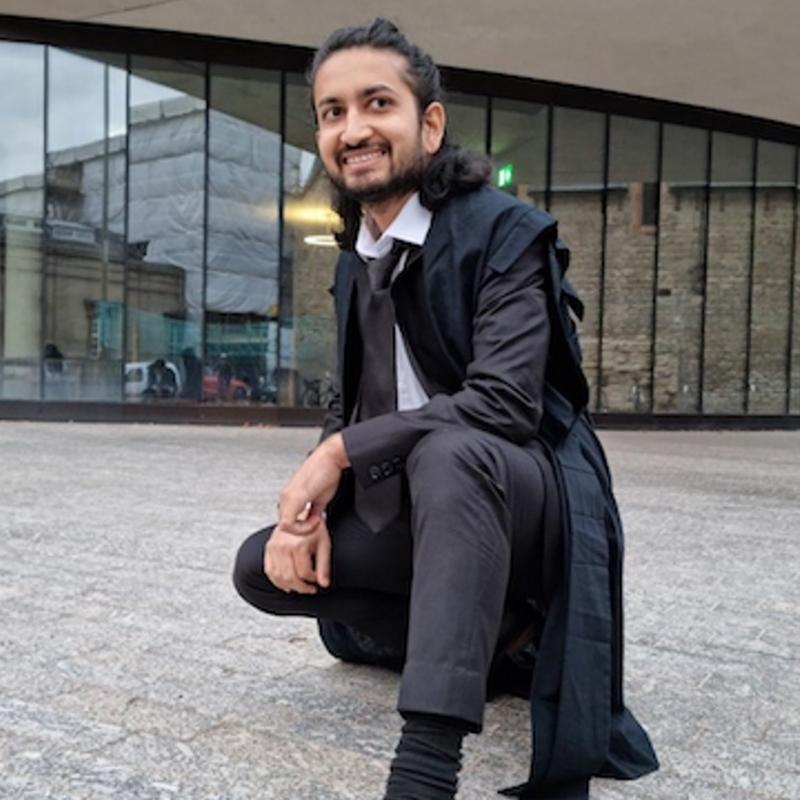Breadcrumb
Hailing from a small Himalayan town in India, Nikunj Agarwal was surrounded by inequality for all of his life.
His lived experiences cemented in him a desire to serve the most disadvantaged populations in his country, leading him first into teaching in a public school. Following this, he moved into policy work, first on a government project with the Department of Education in India focused on systemic transformation of education. He then worked with the government’s internal planning unit on a project enabling women to access entrepreneurship opportunities, followed by an NGO on a project focused on labour rights for women in the informal sector.
"My experiences for the last five to seven years have shown me that the policymaking process does not work in favour of the marginalised. I therefore asked myself what role am I playing in this now, and what role do I want to be playing in the future?"
Policymaking through an interdisciplinary lens
At this juncture in his career, Nikunj was passionate about justice in the policymaking sphere. He also believed that adopting an interdisciplinary approach to policymaking would be the best way of incorporating the needs of the most underserved people in India into the policy process.
Nikunj understood, however, that he had work to do to confront his own biases and ignorance about the world. He began to consider postgraduate study, and undertook research into public policy programmes globally. The Master of Public Policy at the Blavatnik School of Government caught his attention thanks to its emphasis on drawing policy lessons from a diverse range of countries and disciplines. He felt sure that this course would expose him to the diversity of perspectives that would ultimately strengthen his ability to create inclusive policies in the future. The course’s emphasis on deriving lessons for good governance from countries all over the world, using a multidisciplinary approach to understand current policy challenges was a particular pull for him. He felt confident that his policy experience so far, coupled with his desire to learn from his teachers’ expertise and his peers’ experiences made him a suitable candidate for the course.
Applying for the Chevening Scholarship
The journey to Oxford was not straightforward for Nikunj. He knew that without funding, undertaking the MPP would be near impossible. However, thanks to a number of friends in his immediate network who had previously studied in the UK through the Chevening Scholarship, Nikunj came to realise this could also be a route for him to take the MPP. As a policy professional keen to build upon his knowledge by collaborating with people from all over the world, he felt he was a strong candidate for the scholarship. The stories his friends recounted not only of the academic opportunities the scholarship had offered, but the chance to fully immerse themselves in UK culture persuaded him to apply.
As the deadline for the Chevening Scholarship application – which closes in November each year – fell before the MPP application deadline, Nikunj was compelled to reflect more deeply upon what he hoped to achieve by taking the MPP. Among the main motivations he highlighted in his application were his existing leadership skills that he planned to develop over the course of the year and beyond. He also underscored his plans to leverage both the Chevening and Oxford networks as a way to bring together like-minded policy professionals to create further impact. Nikunj described the interview as an open and thought-provoking process that encouraged him to explore and articulate his vision for the future, and how he planned to realise this. In June, he found out that his application had been successful.
"Having a fully-funded scholarship has meant I can focus my energies on the MPP programme. Without it, I don’t think I would be here."
Building a long-term global policy network
Now that Nikunj has arrived in Oxford, he has already been impressed by the range of perspectives the class have been encouraged to consider when addressing policy challenges – from feminism to colonialism to philosophical questions. He has also been thinking more deeply about his long-term aims – he hopes to use the Chevening Scholarship and his time at Oxford to build a vast network of policy practitioners across South Asia and beyond who are working on interdisciplinary policymaking. In this way, he will continue to learn, exchange and develop his ability to create truly sustainable policies long after his time on the MPP comes to an end. Nikunj also hopes to use his network to consolidate the existing strong policy ties between India and the UK to encourage closer collaboration in pursuit of solutions to each country’s most pressing challenges.
Nikunj’s commitment to building networks that will facilitate fair and interdisciplinary policymaking, and to learning from the diverse perspectives of his peers to improve policymaking in India made him an ideal candidate for the Chevening Scholarship. He has already begun to lay the foundations of the lifelong network of colleagues that will flourish throughout the year and further into the future.
Find out more about who can apply for the Chevening Scholarship. Applications close on 2 November 2021.

